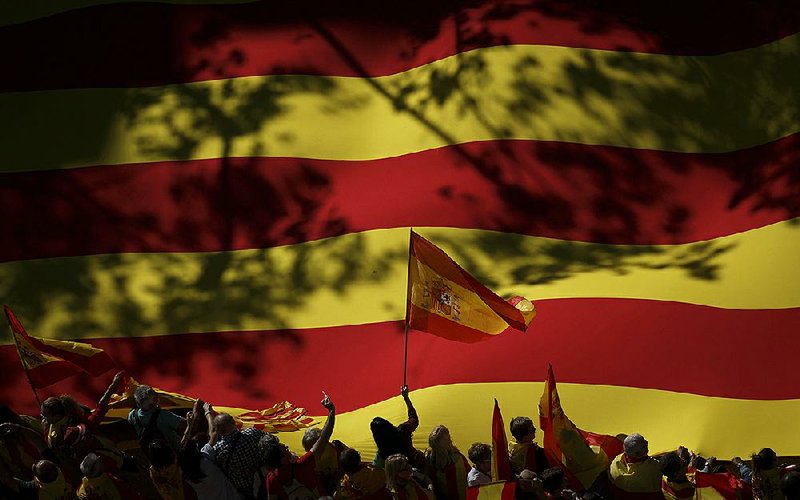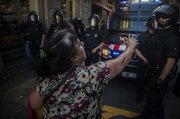BARCELONA, Spain -- Hundreds of thousands of Catalans took to the streets of Barcelona on Sunday to voice their opposition to the region's declaration of independence amid political uncertainty for the region in northeast Spain.
Catalonia's leaders were fired Saturday by central authorities in Madrid who are trying to tame the worst political crisis Spain has seen in decades. So far, Catalonia's ousted leader has insinuated that he won't step aside.
Waving Spanish, Catalan and European Union flags, the protesters described themselves as the silent majority that has been ignored during the wealthy region's bid for independence, which came to a head Friday when the regional parliament voted to secede from Spain.
"We have organized ourselves late, but we are here to show that there is a majority of Catalans that are no longer silent and that no longer want to be silenced," said Alex Ramos, head of Catalan Civil Society, a pro-union grass-roots group.
Ines Arrimadas of the Citizens party in Catalonia told reporters before the march began that "the silent majority of Catalans are once again taking to the street to show that the majority of Catalans feel Catalan, Spanish and European."
Arrimadas walked out of the Catalan regional parliament on Friday as it cast the vote for independence.
Organizers of the rally said more than 1 million people turned out, but police put the figure at 300,000. There was no way to immediately reconcile the figures.
The mood at Sunday's rally was festive. "We won't let Spain be torn apart into pieces," read one banner. "The awakening of a silenced nation," read another.
The Catalan Republic has been declared and Carles Puigdemont is still the president, ousted Vice President Oriol Junqueras said in an opinion piece published in newspaper El Punt Avuion on Sunday. The rebel leaders will continue to work on their independence road map in the coming days, undeterred by "doubts" and "contradictions," Junqueras wrote.
"The Catalan Republic has been born, not with the strength we would want but with the legitimacy of the ballot boxes," Junqueras wrote. "In the next days, we will have to take decisions that won't always be easy to understand."
In response to the lawmakers' vote, Spanish Prime Minister Mariano Rajoy triggered constitutional powers to fire Catalonia's secessionist regional government and call an early regional election for Dec. 21.
Junqueras said in an open letter Sunday that separatists should consider participating in the election. Some secessionists have argued that they should boycott the vote.
Today will be the first working day since the region declared independence and its leadership was fired. It was not known how Catalonia's estimated 200,000 public workers would react to their bosses' dismissal.
Puigdemont has called for Catalans to engage in peaceful opposition to Spain's takeover of regional affairs, saying he and his fired Cabinet would keep "working to build a free country."
Separatist parties and grass-roots groups have spoken of waging a campaign of disobedience to hamper the efforts by central authorities to run the region.
Puigdemont and his ministers could face prison time for their separatist actions. Spain's government has said the ousted Catalan leaders could be charged with usurping others' functions if they refuse to comply with their firing. Spanish prosecutors have also said they may consider rebellion charges against leading separatists.
Puigdemont on Saturday issued a brief prerecorded call for citizens to mount "a democratic opposition" to the takeover.
On Sunday, the Belgian migration minister offered Puigdemont political asylum -- if he needs it.
Two top leaders of the Catalan secessionist movement are already in jail, without bail, as prosecutors consider sedition charges.
The Spanish newspaper El Periodico reported that Spain's Interior Ministry on Sunday ordered the Catalan regional police stations to take down their portraits of Puigdemont.
The top politicians for pro-union parties hoped to use Sunday's rally to launch their election campaigns.
"It's time to take over the streets and take over the ballot boxes," said Albert Rivera, the leader of the center-right Citizens party.
Separatists won 48 percent of the vote in Catalonia in the 2015 regional election, although they took more seats in the regional parliament because of an election law that gives more weight to sparsely populated areas.
Organizers said the rally's goal Sunday was to defend Spain's unity and reject "an unprecedented attack in the history of democracy." Three weeks ago, the same group organized another mass rally that drew hundreds of thousands onto Barcelona's streets -- the largest pro-union show of force in Catalonia in recent years.
"Catalan leaders have broken the law. The central government has let this situation go for too long, for even 30 or 40 years, thinking that we were never going to arrive at this extreme, but here we are," said Angelita Cuesta, a 66-year-old retiree who attended the rally.
"Our society is fractured, there are family members and friends who no longer can talk about politics to avoid conflict," she added.
The Catalan parliament's vote to secede came after an Oct. 1 referendum in favor of independence that was deemed illegal by Spain's constitutional court.
There are fears that the political turmoil in Catalonia could have a severe economic effect, both in the region and on Spain itself.
Addressing the crowd at Sunday's rally, Josep Borrell, former European Parliament president, said the central government's move to take control of some regional affairs was the only thing preventing a full-blown economic crisis in Catalonia.
If the government had not triggered its constitutional powers to run Catalonia, "many of you would have lost your jobs," he said. "If that hasn't happened, it's because ... businesses and markets understand that there won't be [secession]."
Xavier Gabriel, owner of a lottery shop in the Catalan mountain town of Sort, has joined more than 1,500 companies in moving their official headquarters out of the region in recent weeks. Their main fear: that they would no longer be covered by Spanish and European Union laws if Catalonia manages to break away, dragging their businesses into unknown territory.
"The time had come to make a decision," said Gabriel, who employs 16 people and describes himself as a proud Catalan.
Like Gabriel's, the vast majority of companies that moved their headquarters didn't transfer workers or assets, such as bank holdings or production equipment. So far, it's mainly a form of legal insurance. But as the political crisis escalates, the risk is that companies are deferring investments and hiring. There is evidence that tourists are holding off booking, perhaps frightened by images in the media of police crackdowns, street demonstrations and strikes.
Javier Diaz Gimenez, an economics professor at Spain's IESE Business School, said the decisions to move headquarters, while not immediately affecting jobs, were "just the tip of the iceberg."
"Plans to relocate firms or invest elsewhere are going to accelerate and some of it is going to go to, say, Poland, and it's never going to come back," he said.
"People that were thinking about investing in Spain and Barcelona are starting to think again," he said. "It's not just Catalonia. It's the mismanagement by Spain, which is proving that it's not a serious country because it cannot solve this thing."
Information for this article was contributed by Elena Becatoros, Aritz Parra, Joseph Wilson and Ciaran Giles of The Associated Press; by Rodrigo Orihuela, Maria Tadeo, Esteban Duarte, Marine Strauss, Charles Penty, Marine Strauss and Joao Lima of Bloomberg News; and by William Booth of The Washington Post.
A Section on 10/30/2017

